- Home
- Conn Iggulden
The Abbot's Tale
The Abbot's Tale Read online
To Louise Moore
Æthelstan, Edmund, Eadred
Edwy and Edgar
Edward and Ethelred
Three brothers
Two sons
Two grandsons
It is clear this manuscript was never intended to be read. There are references within to an intention to have it destroyed, and we can only speculate as to why that did not happen. Though the recollection of events is extraordinary, almost photographic, there are gaps, as well as examples of vocabulary that occasionally defied translation. Some sections were just too damaged or faded to be made out, after centuries of poor storage. I have mended those holes as best I could.
Translation is always as much art as craft and I have endeavoured to keep the sense flowing whenever it became unclear. The author used paragraphs, but no other punctuation. That made discerning his meaning a challenge in some places. The chapter headings and separation into parts is my own. It is my hope that the result gives some pleasure and casts light on an exceptional mind of the tenth century. Despite his flaws and self-doubt, he was a great man, who knew seven kings.
Conn Iggulden
Prologue
What is a first line, but a door flung open by an unseen hand?
There, I have begun, after so long. Like a crow’s foot dipped in ink and dragged across the page, my hands shake so. Shall I sand these black scratchings from this fine vellum? No grey sheets these, all overused. I see virgin fields, ready for the plough. My best ink grips the page like mortal sin, desiring to remain. Here I am. If you would seek Dunstan, I will not deny my name.
My first recollection is of sweetness, of honey stolen from a pot on my mother’s shelf when I was three or four years old. I fell asleep in the sun with it smeared across my face and I do not think I have ever been as happy again. Yet I woke at the touch of some mindless creature, some fat fly or moth, struggling in the gummed mass. I sprang up, dashing at myself, feeling the hum of wings on my lips.
My mother came when I called, blotting out the sun. I have not forgotten the sensation of it, the strange thrill of fear and disgust – and I recognise it now. My oldest secrets rustle and climb to the edge like those winged things, wanting to be said. Like prayers, they wish to be wrenched forth, quivering wet in their birth.
I have broken my vows. I have betrayed those I loved and those who loved me. I have murdered innocents. There, in the bare English tongue all those with eyes can read. Too many know their English now. I look upon my words and I am afraid, though I have had my three score years and ten. I should fear nothing. It is true my hand shakes, yet my heart trips in my chest and I am light. I am all light.
Perhaps I will consign these precious sheets to the fire. No one will disturb me now; I have earned that much. These hands that hold the quill are just bones and paper-skin, so like vellum themselves as they whisper against each other. Brother Talbot once said they were a workman’s fists, all scarred and thick. Well, time served him well, didn’t it, with his delicate scribe fingers? I have trod down the soil over his dead face with my bare heels, and only the moon as witness.
I have worked my whole life, from six years old when I first piled bricks for workmen on my father’s land, in exchange for crusts of bread and a draught of cider. I have prayed and I have dropped my sweat onto the forge. I have made swords and I have used them. I have made a cask or two of wine in my time, taking grapes from different vines. I have pissed in a bottle once or twice as well, when I did not like a man – and I have watched him smack his lips and tell me it was so smooth and extraordinarily fine that I was half tempted to try my own vintage. I have loved a woman and she ruined me. I have loved a king and yet I ruined him. And all I have gained in return for my lifetime of labour is fame and power and servants and an abbey.
Still the creatures brush at me, the words crowd my lips. I will set my tale on calfskin, with ink and feather, seated on English oak, dressed in black wool and smooth flax linen. I am a man of this world and the next, but you will not see deception in me. All my deceptions are behind.
I believe I took my first breath in the year of our Lord 920. My parents were mismatched and somewhat more concerned with their own safety than with registering my birth. They fled from the older sons of my father, so my mother cooed to me later, the daft old hen. Four of them opposed the match and threatened to spill the old man’s blood.
I was born when King Edward the Elder was still on the throne, son to Alfred the Great and father to King Æthelstan. Those three men took our small kingdom of Wessex on the south coast – and by war and wit and cunning, they made it into England. That is what matters. Edward the Elder ruled as I grew, and I thought then that he always would be there, like a great oak in the forest. Well, I was wrong about that. His sons and grandsons would mean more to me.
Of all the estates of man in the world, the best is to be born the fine, shrieking son of a king. I have seen mighty lords fall to their knees at the sight of a babe, all for a crown painted on its crib. Yet there are more men than thrones and it does not come to many. If you can’t be born a king, be made a king, though that has thorns. When violent men secure your crown, they keep a knife at your throat ever after. Last, and not the least of these, is this: if you can’t be born a king or made a king, you might still anoint one.
In some ways, the third path holds sway over all. I chose the Church. I could be glib and say it came about because my father made a poor match, denying his future children the halls of power for the sake of youth and a saucy laugh, but a man can run mad winding his life back – and it is always more tangled than a single thread. There is never one truth, one love, or one enemy. I wish it had been so simple.
The calfskin sheets are smooth under my palm. The door is open and yet, somehow, I hesitate. Settle, Dunstan! These halls are the place for truth, much more so than the confessional. No, never there, though I have bored a priest or two in my time. A man must confess or be considered an unrepentant sinner, but only a fool would expect the seal of the confessional to hold. I would not whisper these words to any crouching priest, much less the open congregation. Should I tell a man who might one day consider me for high office that I lay alongside a woman and was taken with a strange sickness? Vows can be broken. God knows, I have broken them all.
There never was a sin I could not learn to love. Yet here I sit, with a quill and a vial of oak-gall black, and I scratch away. The ink is called encaustum, or ‘the biter’, for the way its acid eats the page and lasts for ever. Words can bite – and memories can worry you like a dog. The flames leap merrily as I write. They must consume all when I am done. They may take me too, in the end, but they will keep me warm first. Perhaps I will be found like poor Brother Severus, whose body vanished into ash and left only his feet and one hand still in the chair! What devil took him so, that charred him before he even went to hell?
Am I afraid of the other place? What fool is not? Yet I have raised great churches to set against my sins. It is my fervent hope that there is no eternal torment waiting for me now. How they would smile then, the dead, to see old Dunstan cast down! Made young again, perhaps, to be torn and broken for their pleasure. I could bear it better if I were young, I know. How those saints would laugh and shake their fat heads. I wonder, sometimes, if I can feel them clustered around me, all those who have gone before. Like bees pressing on a pane of glass, I feel their souls watching. Or perhaps it is just the wind and the scratching of woodworm in cantilevered joists.
Settle, Dunstan. Tell the story.
PART ONE
Behold the Boy AD 934
‘Remember not the sins of my youth, nor my transgressions.’
Psalms 25:7
1
I could have hung on that cliff all day, i
f they hadn’t broken my fingers. My hands have always been strong, but when bones crack, there is no true anchor, not even for an ocean of rage. Yet I clung on for a time even so. Near the end, as I glared at them without pleading or begging, all their laughter and mockery died away, which gave me some small satisfaction. That little crowd of men and women stood around the edge, just waiting for me to fall. They watched me hold on to crumbling earth with torn and swollen hands and yet remain to spite them.
I saw Encarius abashed then, he who had become my friend. I tried to form the words to tell him I forgave him, because I had no other way to take revenge and I wanted him to wince when he recalled me ever after. Vengeance is a fine thing, but forgiveness can be just as cruel.
I did not fear death. In my youth, I do not think I could imagine it. I ground my teeth as my fingernails tore on the stone, and I remember trying to look down between my outstretched arms as I felt my grip fail. Bones splintered and I was still there, thinking of all the things I would do to them if I survived. I was fifteen years old, but I had broad shoulders and black hair on my arms and I looked more of a man than some of those twice that age who stood and wound their priestly fingers together like beggars. Oh, their pious faces! I can see them still.
When I knew I could hold on no longer, I called to Encarius, asking him to make the sign of the cross on my forehead so that I would more swiftly pass through purgatory and on to heaven. He came forward at that, of course, willing to do so little when it meant so much. I watched him bend and our eyes met, though he did not want to look on me. He was the architect of my destruction, my accuser, yet he shook his head at me as if I were at fault.
‘I would change your fate if I could, Dunstan,’ he said. He touched his tongue and took up a smear of dust, rubbing it in spit before he pressed his cold hand to my skin.
‘You are a good fellow, Encarius,’ I whispered to him. ‘Will you allow me to confess to you?’
He saw how my arms trembled and yet he still looked askance at me, as one who did not trust me even then. I said nothing more until he leaned in, just pleaded with my eyes. As he bent to me, his wife or some other drab called in warning, but it was too late. I reached up and gripped his robe, pulling him over the edge and falling, oh, falling, like Lucifer before me.
My father took me first to old Glastonbury, my beloved isle, sailing through the mists. It was where King Arthur had his end, where Excalibur was thrown into the salt marshes that surround it. My father sought a miracle for his son, possessed or eaten up by devils as I was. I was given to fits and rages then.
I sometimes think the old man was as much a pagan as he was a strict follower of Christ. He kept some odd charms sewn into his robes and mail, I know that. Glastonbury is far older than the true faith’s arrival on these shores. Thousands of years of witchcraft and worship have seeped into that damp ground. So they say. I went out on the midsummer a few times, all a-fevered and looking for the naked women. I never found them, nor caught even a glimpse of breast or leg. It was ever thus, with me.
The boat had slopping black water in its bilges, I recall. I was thirteen years in the world and I kept tugging my father’s sleeve and trying to draw his attention to it. I could not understand how a vessel could float and yet take on water, and I was afraid it would rise up and swallow us along with the poleman, who was red-faced and seemed somewhat addled in his wits.
My father pulled his sleeve from my grasp and I left him alone. I’m told Heorstan had been a great barrel-chested fellow thirty years before, when he was made thane to King Edward of Wessex. In his own youth, to me then as far off as the days of King Arthur, my father Heorstan had known Alfred Magnus, the Great, the man who made Wessex the kingdom that would one day rule all of England. Reigns were longer then. Nowadays, it seems a man cannot turn round without finding a new face wearing the crown.
My younger brother Wulfric stood up in the prow as the boatman poled us along.
‘Be careful, boy!’ my father snapped.
Wulfric tried to look abashed, but he was too full of wonder at the strangeness of the island and the mist that lay all around. Creeping things dropped into the still waters as we passed through reeds. Those dark marshes stretched all the way to where the sea had broken its banks, some dozen miles away. They rose and fell with the tides, so thick with salt that not much grew.
Once or twice, some sleeping bird would be startled and rise in a mad flurry. The waterways lay like veins around us, unseen, so that the sounds echoed oddly and were changed.
As I watched, Wulfric reached out to wisps of white fog, unable to understand how it could seem so thick and yet vanish before his eyes. I will say I loved him, but his head might have been a block of polished bone for all the good it was. Wulfric seemed sharp enough in speech, but he could not master his letters. As his older brother, I tormented him for it.
In so many ways I am not the boy I was, with my spites and quick judgements. I was so sure then that I was surrounded by enemies! It has taken generations for me to understand I made them come at me. Yet when I think back to my own cruelty and torment of Wulfric, well, it still makes me laugh.
Wulfric tried to jump from the prow to the dock and I saw my father snatch him back, more concerned with him falling to drown than he had ever been with me. The old man must have been seventy then, just about, his two boys born to a woman forty years younger. Heorstan gave my mother a fine home on twelve hides of land, good coin in exchange for her youth. Perhaps he needed a nurse and I was the happy result. Or perhaps she plucked and stroked him back to life.
The isle of Glastonbury did not get so many visitors in those days, nothing like it does now. We were greeted on the docks by two boys to carry the bags and two Irish monks who spoke only Gaelic, which I did not know. In the mists, that liquid stream of sounds seemed strange to me, almost magical, as if I only had to listen hard enough and it would no longer sound like someone choking to death.
My father bowed his head to give them honour, he a thane who had known kings. I kept my silence, though Wulfric bounded out amongst them, exclaiming on everything while I winced and wished he would just keep his peace.
I could see the porter boys were amused. The two lads nudged each other and grinned, and of course, poor Wulfric smiled back at them as if they were his equal.
I pulled him roughly to me and was bending down to whisper that they were no friends of ours when I caught a sickly odour wafting up from him. I shoved him away then with a sound of disgust. It had been a long time in the boat and Wulfric had soiled himself. Yet there he was, skipping along as we took to the path and headed to the little abbey they had there then, where miracles were an almost daily occurrence.
The rest of our party trudged on and the mists thinned as we climbed onto a higher path. No one was listening and the only noise was from our steps.
I whispered, ‘You have shat yourself, Wulfric.’
I said it in a furious hiss, because he was so cheerful, but I felt even then that he was a reflection on me and especially my father. Heorstan seemed oblivious to such things in his later years, but I could protect his dignity even so.
Wulfric looked wounded, as if I was the one in the wrong rather than him. He flushed deeply and glanced at the two boys carrying our bags. They seemed to have noticed nothing, but they surely would.
‘Go ahead, Wulfric,’ I said. ‘The wind is behind us. Go on ahead of the rest so that we cannot smell you.’
He looked close to tears as he did as I told him. I think I hated him then, for his weakness. One of the Irish monks called out to him, but no one spoke their strange tongue and my father barely looked up from his travails. It was enough of a struggle for the old man just to keep up with the rest of us, his furs and mail weighing him down like a millstone around his neck.
Looking back on it, I know I should feel ashamed that Wulfric fell off the path. He vanished from sight as he stepped off an edge and broke a bone in his heel, landing too hard on a stone. We had to wait, tho
ugh we were tired and hungry, while the two monks climbed down and brought him back up. They muttered to each other when they saw him limping, though we would not know till later that he had actually cracked his foot. He was weeping – and looking in accusation at me, if you can believe it. I was ashamed for him. If he had fallen into the marsh and been drowned it would have been a thing to grieve, but I would have forgotten him by now. I always tried to protect Wulfric, but some lives are touched by dark.
The sun rose on my right shoulder as we went on, clattering along a wooden walkway that must have been as old as Caesar. I found myself at my father’s side, scowling at Wulfric as he limped and made more of his injury than he should have. My father was breathing hard and sweating like a dray horse. He nodded in relief to me as we came to the outer wall of the rough place they dared to call an abbey in those days. Even after the peace of Alfred and King Edward, monks still knew the value of a good wall. It was fine, golden Wessex stone too, none of your stockade camp. Yet the gate they heaved open for us was made of wood and had to be lifted by the two Irishmen, to keep its trailing foot from dragging in the mud.
Nowhere was truly clean then, at least where men worked and slept. The passage of our feet turns grass to a quagmire, which is the way of the world and means nothing more than that. In time, we take that mud and make bricks and tiles, so you can keep your damp peasant huts and shiver as I warm my hands in the dry.
Wulfric was given into the care of a tutting matron. I watched the woman put her big, pink arm around him to help him along. I was still scowling when he looked back. I raised my head sharply, trying to remind him to keep silent and to be watchful and to remember his name and line. I saw Heorstan greeted by a man in plain black wool, his scalp like a brown knee, with knobs and freckles and odd planes to it. I waited patiently, content as they talked just to stare around the abbey yard. I looked up to where some men were labouring, and my entire life changed with that glance.

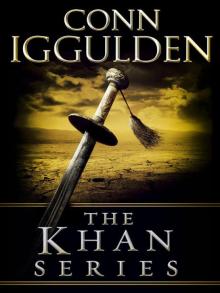 The Khan Series 5-Book Bundle
The Khan Series 5-Book Bundle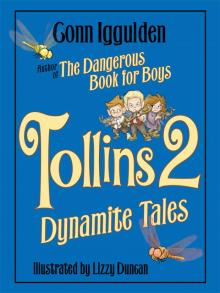 Tollins 2: Dynamite Tales
Tollins 2: Dynamite Tales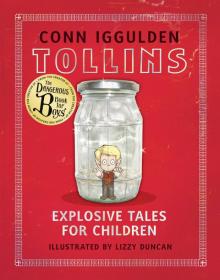 Tollins: Explosive Tales for Children
Tollins: Explosive Tales for Children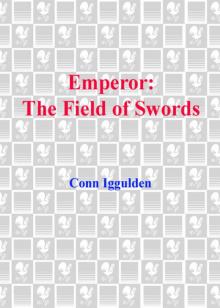 The Field of Swords
The Field of Swords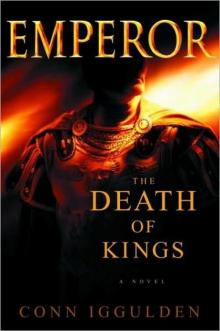 The Death of Kings
The Death of Kings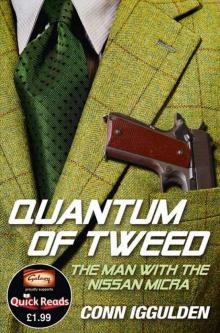 Quantum of Tweed: The Man With the Nissan Micra
Quantum of Tweed: The Man With the Nissan Micra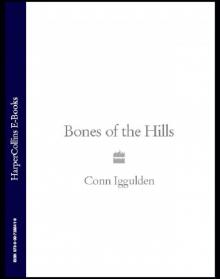 Bones of the Hills
Bones of the Hills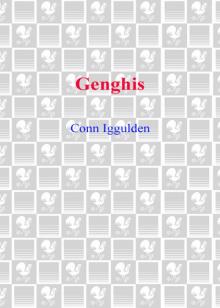 Genghis: Birth of an Empire
Genghis: Birth of an Empire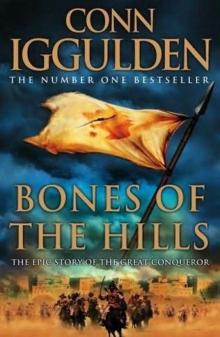 The Gates of Rome
The Gates of Rome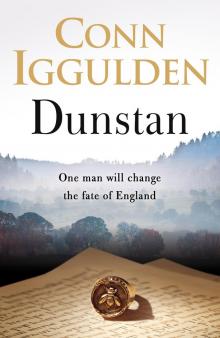 Dunstan
Dunstan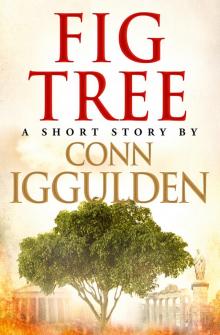 Fig Tree
Fig Tree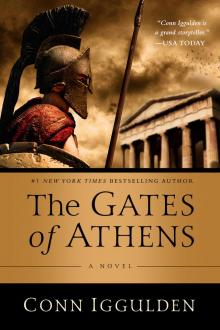 The Gates of Athens
The Gates of Athens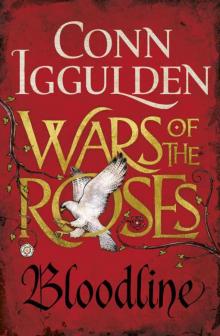 Stormbird
Stormbird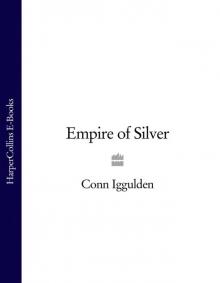 Khan: Empire of Silver
Khan: Empire of Silver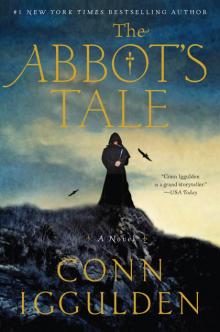 The Abbot's Tale
The Abbot's Tale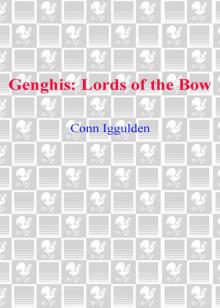 Gengis: Lords of the Bow
Gengis: Lords of the Bow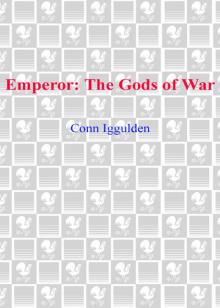 The Gods of War
The Gods of War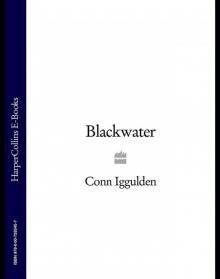 Blackwater
Blackwater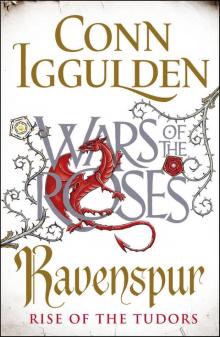 Ravenspur: Rise of the Tudors
Ravenspur: Rise of the Tudors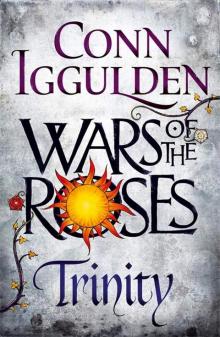 Wars of the Roses: Trinity (War of the Roses Book 2)
Wars of the Roses: Trinity (War of the Roses Book 2)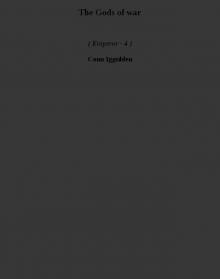 The Gods of war e-4
The Gods of war e-4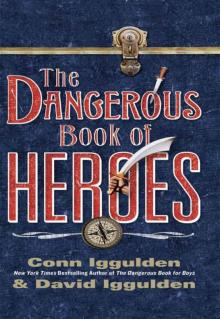 The Dangerous Book of Heroes
The Dangerous Book of Heroes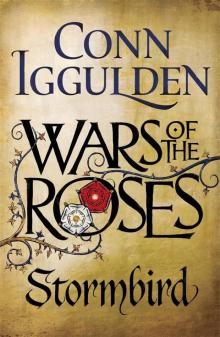 Stormbird wotr-1
Stormbird wotr-1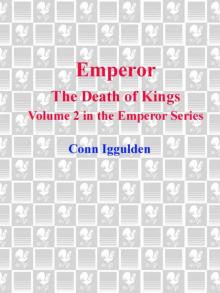 Emperor: The Death of Kings
Emperor: The Death of Kings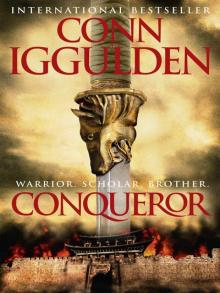 Conqueror (2011) c-5
Conqueror (2011) c-5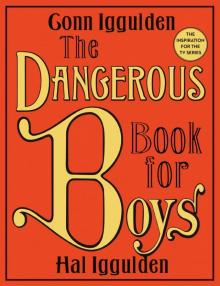 The Dangerous Book for Boys
The Dangerous Book for Boys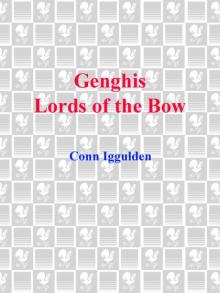 Genghis Lords of the Bow
Genghis Lords of the Bow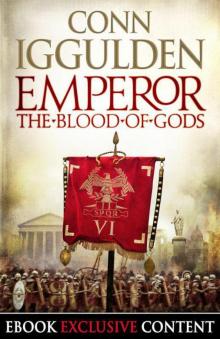 Emperor: The Blood of Gods (Special Edition) (Emperor Series, Book 5)
Emperor: The Blood of Gods (Special Edition) (Emperor Series, Book 5)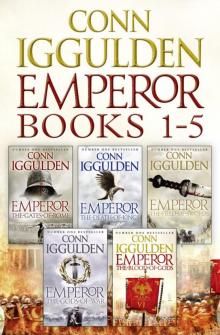 The Emperor Series: Books 1-5
The Emperor Series: Books 1-5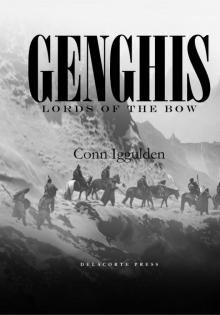 Lords of the Bow c-2
Lords of the Bow c-2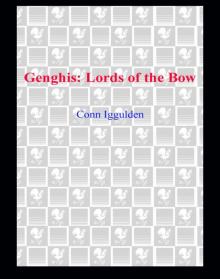 Lords of the Bow
Lords of the Bow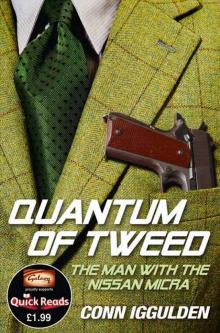 Quantum of Tweed
Quantum of Tweed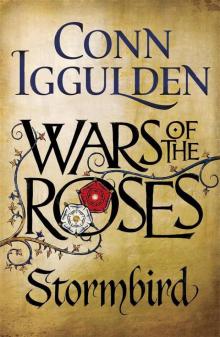 Wars of the Roses 01 - Stormbird
Wars of the Roses 01 - Stormbird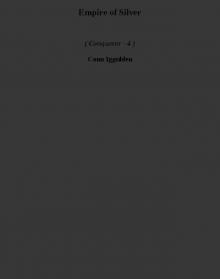 Empire of Silver c-4
Empire of Silver c-4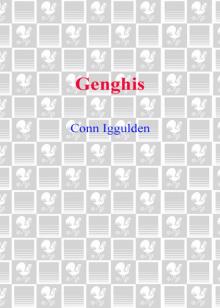 Birth of an Empire
Birth of an Empire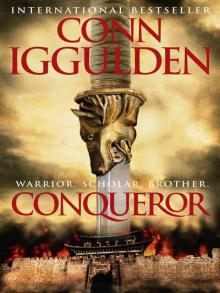 Conqueror (2011)
Conqueror (2011)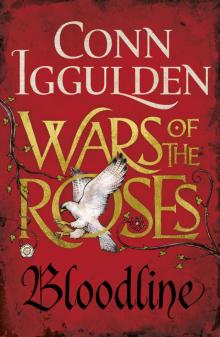 Wars of the Roses: Bloodline: Book 3 (The Wars of the Roses)
Wars of the Roses: Bloodline: Book 3 (The Wars of the Roses)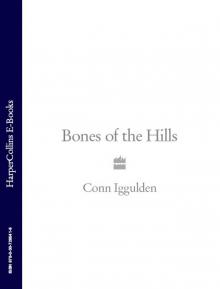 Bones Of the Hills c-3
Bones Of the Hills c-3 Empire of Silver
Empire of Silver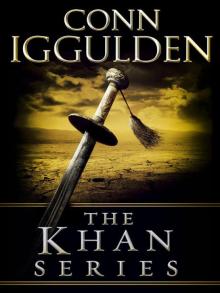 The Khan Series 5-Book Bundle: Genghis: Birth of an Empire, Genghis: Bones of the Hills, Genghis: Lords of the Bow, Khan: Empire of Silver, Conqueror
The Khan Series 5-Book Bundle: Genghis: Birth of an Empire, Genghis: Bones of the Hills, Genghis: Lords of the Bow, Khan: Empire of Silver, Conqueror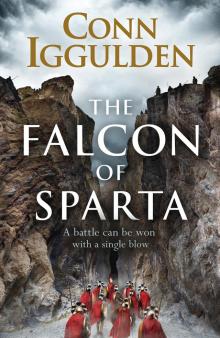 The Falcon of Sparta
The Falcon of Sparta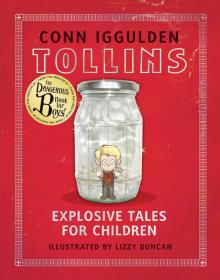 Explosive Tales for Children
Explosive Tales for Children